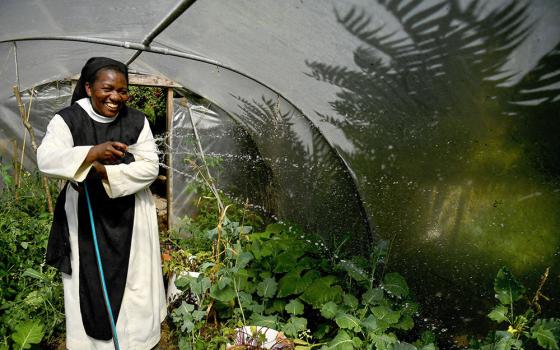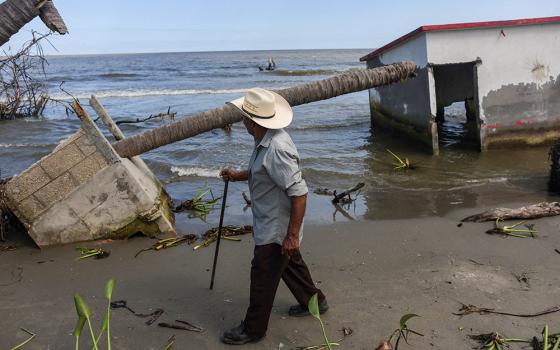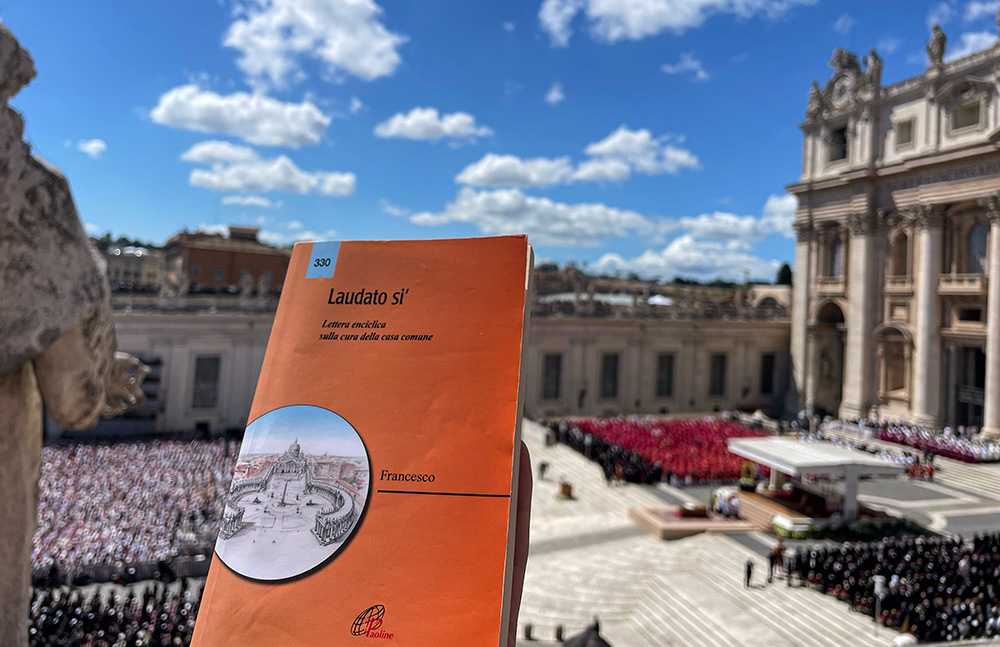
A copy of the encyclical "Laudato Si', on Care for Our Common Home," at Pope Francis' funeral in St. Peter's Square on April 26, 2025 (Tomás Insua)
When the late Pope Francis penned his groundbreaking encyclical letter "Laudato Si', on Care for Our Common Home," it was hailed by some as the most influential contribution the Catholic Church has ever made to the global debate on any given topic.
Yet, a decade later, a frank look at the precarious state of our common home could lead to the opposite conclusion. Despite Francis' groundbreaking appeal, the ecological crisis and the climate emergency continue to worsen. The poorest among us are being hit hardest — and the harm continues to accelerate. Scientists are ringing alarm bells with increasing desperation.
Was Laudato Si' a powerless drop in the ocean? Or did it set in motion a powerful oceanic undercurrent that will ultimately prove transformative despite the chaos on the surface?
First, let us recall the early days. For the first time in the long history of the Catholic Church, a papal letter was eagerly awaited in advance, rather than announced by surprise as it typically happens. The novelty of the first-ever papal encyclical on the ecological question generated intense interest. To be precise, it was nearly 18 months earlier that the news of an upcoming eco-encyclical was first reported in the press, in January 2014. Journalists continued to cover the story with increased attention in subsequent months.
After a year and a half of headlines about this mysterious document, expectations were high. Very high. So much that, when the encyclical was finally ready, the Vatican organized the press conference in its main conference hall, rather than its usual — and smaller — press hall. There was no space to accommodate the countless journalists and ambassadors eager to attend.
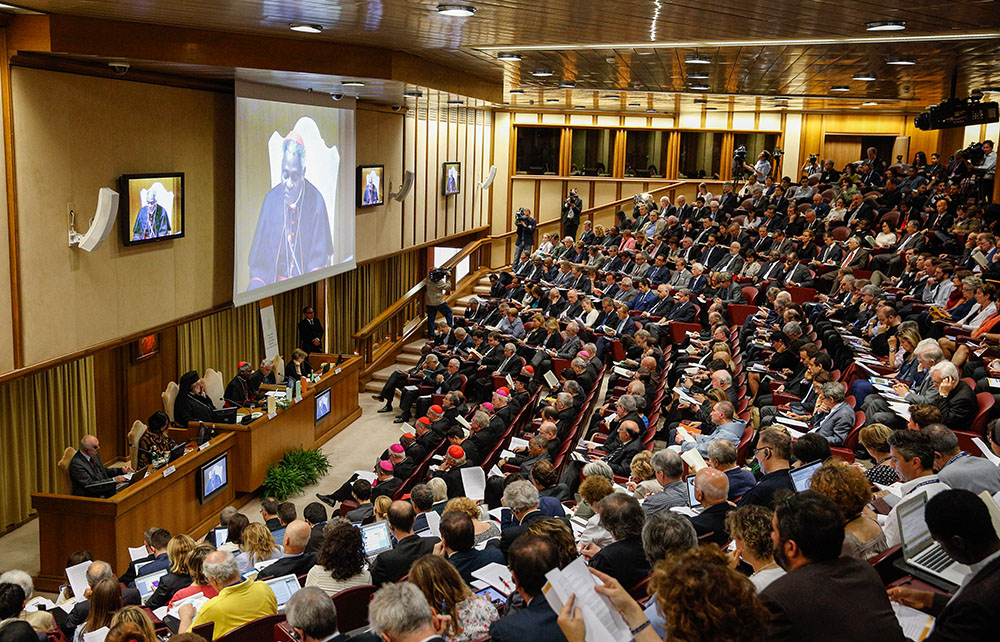
Cardinal Peter Turkson, then president of the Pontifical Council for Justice and Peace, speaks during a news conference to present Laudato Si' in the Vatican Synod Hall June 18, 2015. (CNS/Paul Haring)
Those high expectations were satisfied — and exceeded. Francis delivered a brilliant master class. Laudato Si' laid out his great vision for the future of our common home. Building firmly on Catholic tradition, ranging from the scriptural and theological basis for creation care all the way to teachings of his predecessors and of bishops' conferences, he proposed a distinctively Christian message, yet accessible to and in dialogue with the outer world.
Eye-opening concepts such as "integral ecology," "ecological conversion," "universal communion," "interconnectedness" and a critique of the "technocratic paradigm" and the "throwaway culture" enriched the grand vision. Moreover, the Pope of the Peripheries highlighted how "the cry of the Earth and the cry of the poor" are one single, interconnected cry. At its core was the wisdom of his model and inspiration, St. Francis of Assisi.
Rivers of ink were spilled in response. Never before had a papal encyclical been so widely cited. Never before had an encyclical been more widely engaged across continents and sectors of society — scientists, theologians, philosophers, policymakers, economists, activists, faith leaders, artists and more.
Laudato Si' had a message for everyone, sparking a fascinating dialogue between the Catholic Church and the world. Volumes such as the Laudato Si' Reader provide a glimpse of the diverse range of responses.
Naturally, a few loud voices — particularly those close to the fossil fuel industry — expressed their greed-driven dissent.
In subsequent years, the octogenarian pontiff modeled his Laudato Si' call for "decisive action, here and now." He tirelessly uplifted the Laudato Si' message, with youthful energy and drive — hosting interfaith climate summits in the Vatican; sending delegations to the annual U.N. climate summits; engaging and reprimanding oil CEOs; delivering countless speeches and messages for environment-related events; welcoming victims of climate disasters or sending prayers their way; decreeing the Vatican's transition to solar energy; hosting a special synod on the Amazon and issuing his subsequent love letter Querida Amazonia; encouraging teenage activists in their climate strikes.
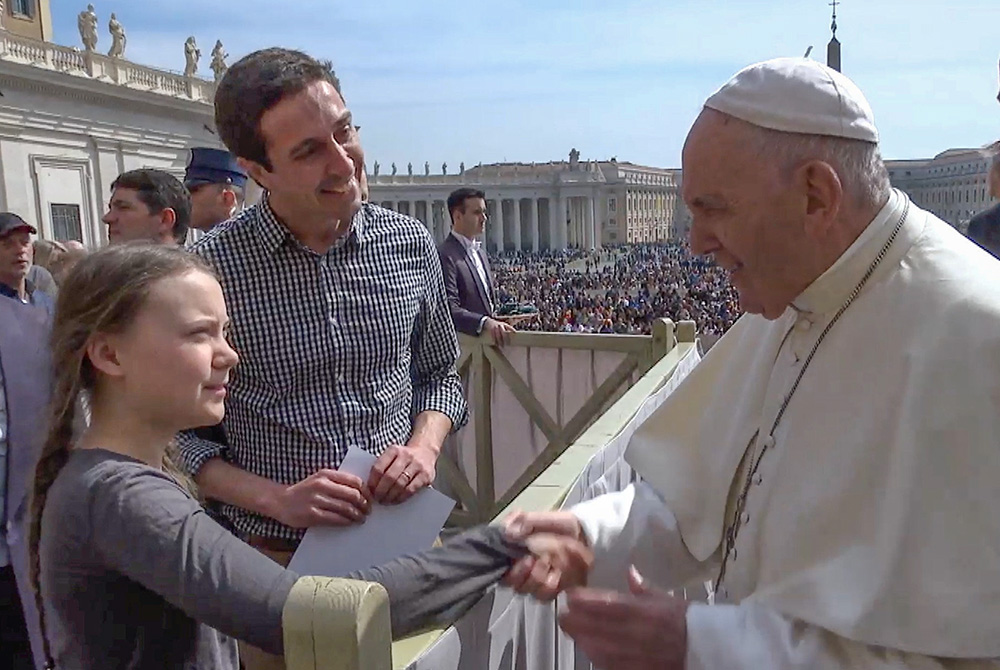
Pope Francis meets 16-year-old climate activist Greta Thunberg on April 17, 2019. (CNS/Vatican Media)
However, humanity did not really listen. Many distractions and crises got in the way. After the COVID-19 pandemic, Francis vented his frustration with the slow progress of climate action through an unprecedented move: an "encyclical follow up" publication from the same pope. And so Laudate Deum arrived in 2023.
Subtitled "On the Climate Crisis," the new text was blunt, adopting much starker language. Flagging that the church, governments and society were moving too slowly, the Latin American pontiff rang the alarm bells as loudly as he could: "We are now unable to halt the enormous damage we have caused. We barely have time to prevent even more tragic damage."
And still, despite those renewed appeals, we keep racing toward the precipice. The burning of polluting fossil fuels continues to worsen. Deforestation continues to worsen. Extinction of species continues to worsen. Toxic air pollution continues to worsen. All other forms of pollution also continue to worsen. Most promises and goals set in Paris in 2015 continue to remain empty words.
No surprise, climate disasters also continue to worsen. Mega floods, mega wildfires, mega droughts, mega hurricanes, mega heat waves. Mega everything. More frequent and deadlier — hitting hardest the poorest among us.
Scientists continue to sound the alarm. If things were looking ugly in 2015 and are looking uglier now in 2025, science makes clear things will get even worse in years to come. We are about to cross terrifying tipping points on planet Earth — collapse of ice sheets, coral reefs and rainforests. Those irreversible events will further accelerate the crisis, pushing hundreds of millions out of their homes across the Global South.
Advertisement
As Francis warned in Laudate Deum, "The world in which we live is collapsing and may be nearing the breaking point." And our children and grandchildren will have to deal with the chaos and trauma.
Sadly, despite the tremendous efforts of that holy pontiff, still humanity is not listening. Global attention to the topic is at its lowest level in a long time, drowned by the competing priorities of brutal wars and geopolitical crises.
To make it worse, climate denialism — which was fiercely denounced by Laudate Deum — now dominates the halls of power of the top historic polluter, the United States. Rather than drastically reducing carbon pollution as requested by Francis, the world now witnesses the "drill, baby, drill" madness of the fossil fuel industry with unconditional government support. The corporate takeover is so dramatic that even U.N. agencies are now censoring the word "climate" to avoid being punished by the White House.
So, was Laudato Si' a drop in the ocean after all? Not quite.
As historian Arnold Toynbee put it in 1948:
The things that make good headlines ... distract our attention from the slower, impalpable, imponderable movements that work below the surface and penetrate to the depths. But of course it is really these deeper, slower movements that, in the end, make history, and it is they that stand out huge in retrospect, when the sensational passing events have dwindled, in perspective, to their true proportions.
Despite the noisy splattering of news headlines on the surface, Laudato Si' set in motion a powerful undercurrent that is sweeping through the ocean. Or, rather, it dramatically accelerated an undercurrent that was already underway.
Creation is a priority for the church — especially in the Global South, where most Catholics live. There is no going back. Francis' papacy will be remembered as the one that, building on our long and rich Christian tradition, took a vigorous leap forward to uplift the notion of God as Creator and enshrine creation care as a crucial priority.
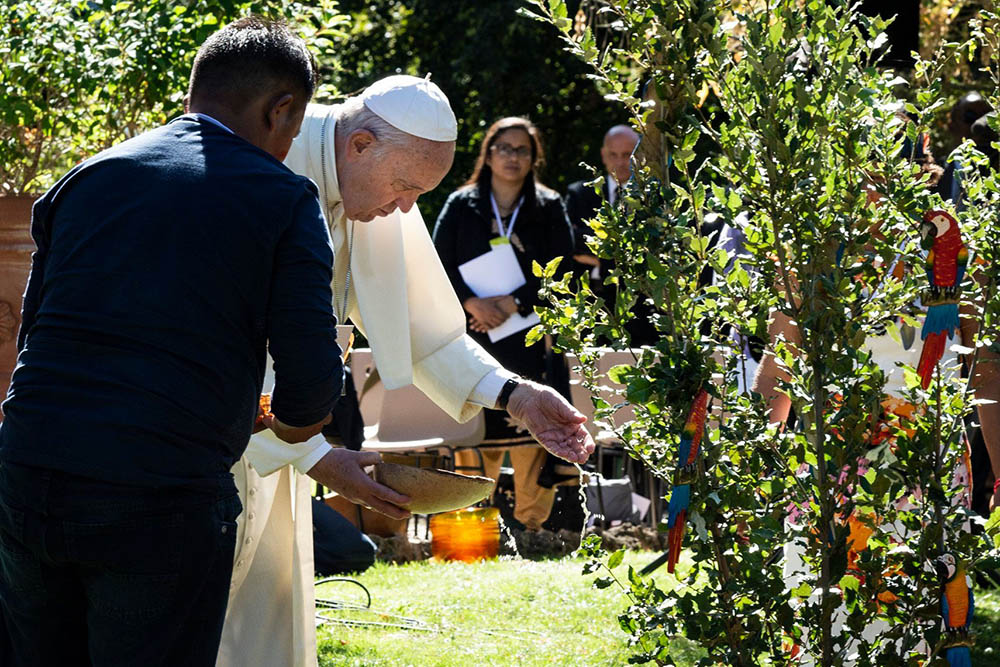
Pope Francis plants a tree in the Vatican Gardens Oct. 4, 2019. (Laudato Si' Movement)
Laudato Si' already has a living legacy. I was blessed to witness firsthand some of its fruits, which instill much hope.
- The birth of the global Laudato Si' Movement, with its nearly 20,000 grassroots leaders trained as Laudato Si' animators, and of ecclesial networks regionally.
- Countless projects in parishes and local communities to install renewable energy, divest from fossil fuels, and other tangible steps, supported by the Vatican's Laudato Si' Action Platform.
- Beautiful artistic interpretations of the encyclical, such as the film "The Letter: A Message for Our Earth" by an Oscar-winning company.
- Academic ventures such as the joint diploma in integral ecology by pontifical universities in Rome or the Laudato Si' Research Institute at Oxford University in England.
- The ASSISI Terra Laudato Si' initiative in the Franciscan sanctuaries of Assisi, Italy.
The list goes on and on.
Moreover, Francis coupled the Laudato Si' release with an equally important sister. Just a few weeks after publishing the encyclical, he instituted the World Day of Prayer for Creation on Sept. 1 — also known as Creation Day or the Feast of Creation — in response to an invitation of the Eastern Orthodox Church.
Through annual statements marking that special day, Francis continued to motivate the church to bring Laudato Si' to life in collaboration with fellow Christian churches, also as part of the larger Season of Creation celebrations throughout September. Thousands of parishes and local communities celebrate it every year.
One could rightly argue that those beautiful fruits do not match the scale of destruction that continues to proceed unchecked, even when combined with the inspiring action that also is taking place in other churches, faiths and corners of society. True. Those fruits actually are far from matching the scale of the crisis.
Yet, the most important legacy of Laudato Si' will be the decisive attention it brought to the spiritual and moral roots of these interconnected crises. Given the sheer scale of this mess, it is imperative to address those root causes.
An environmental lawyer, Gus Speth, described the issue quite succinctly:
I used to think the top global environmental problems were biodiversity loss, ecosystem collapse, and climate change. I thought with 30 years of good science we could address those problems, but I was wrong. The top environmental problems are selfishness, greed and apathy — and to deal with these we need a spiritual and cultural transformation, and we lawyers and scientists don't know how to do that.
Instead, it was Francis who knew how to do that. For starters, he put the spotlight on fundamental values such as justice and solidarity with the poor and children. Moreover, Laudato Si' provides a beautiful road map for Christians to undergo an "ecological conversion," a deep transformation of the heart to see the world as a "splendid universal communion" of all creatures praising our Creator.
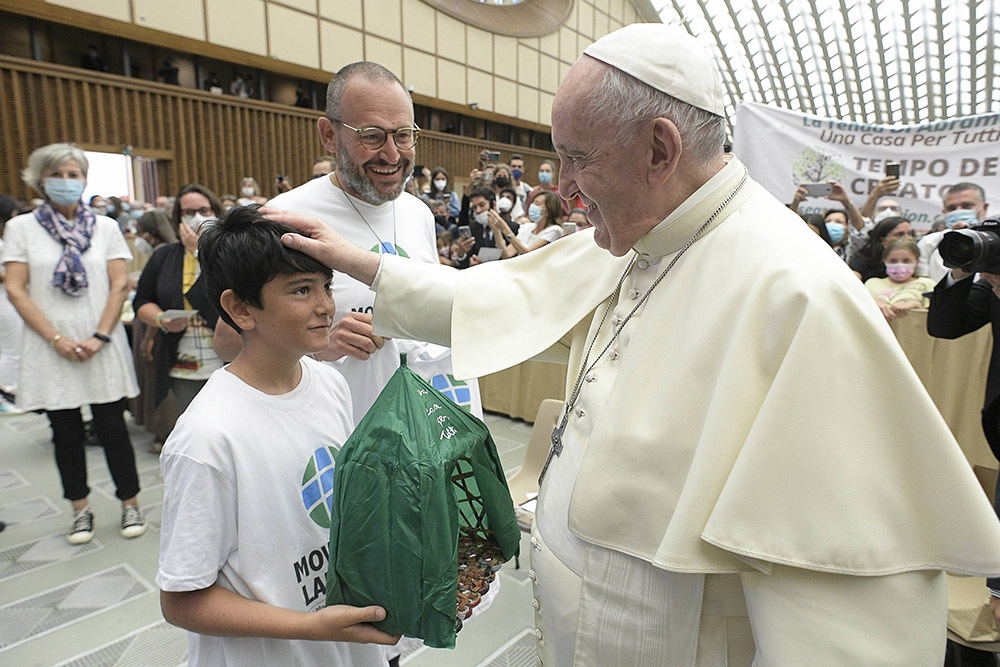
Pope Francis celebrates "Creation Day" on Sept. 1, 2021, with the Laudato Si' Movement. (CNS/Vatican Media)
That is the very difficult but truly transformative task that is needed — and one that is already underway, across faith traditions.
The theology and spirituality of Laudato Si' are beginning to permeate the ethos of the massive family known as the Catholic Church. That is the powerful undercurrent in the ocean. Slowly but steadily, creation is gaining more attention in Christian spirituality, theology, liturgy and catechesis, with countless books and initiatives underway. Creation Day on Sept. 1, in particular, stands out for its potential to become a liturgical feast in many Christian churches, grounded in ancient and rich symbolism in the Eastern Church.
Gradually but decisively, this "ecological conversion" unfolds. The rediscovery of the notion of God as Creator and of this world as a sacred gift will bear abundant fruit for decades — perhaps centuries — to come. Without a doubt, Laudato Si' will prove to be as transformative as Rerum Novarum in the 19th century, when Leo XIII opened the fruitful chapter of Catholic social teaching.
What will ultimately prevail? The dark forces making Laudato Si' look like a powerless drop in the ocean? Or our efforts to help it become the most powerful of oceanic undercurrents?
That outcome is up to us. Let us continue walking with Pope Leo XIV in writing this next chapter, which is already off to a promising start. Now that Francis of Rome has recently joined Francis of Assisi in standing face to face with God, let us honor their love for creation by uplifting their wisdom and turning it into action.




